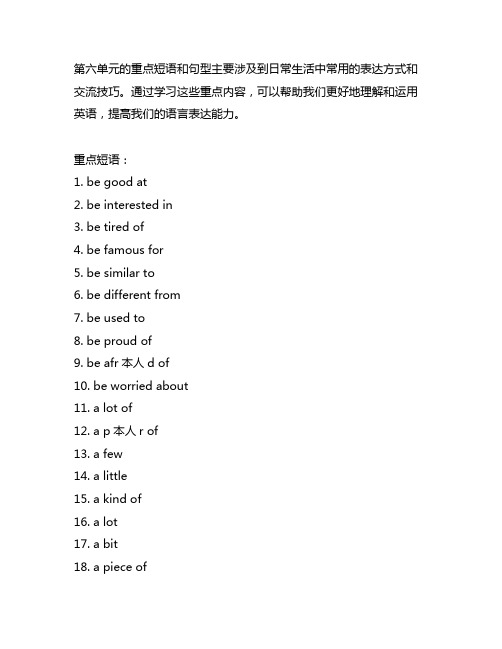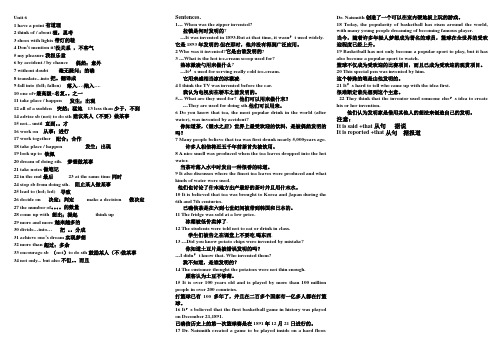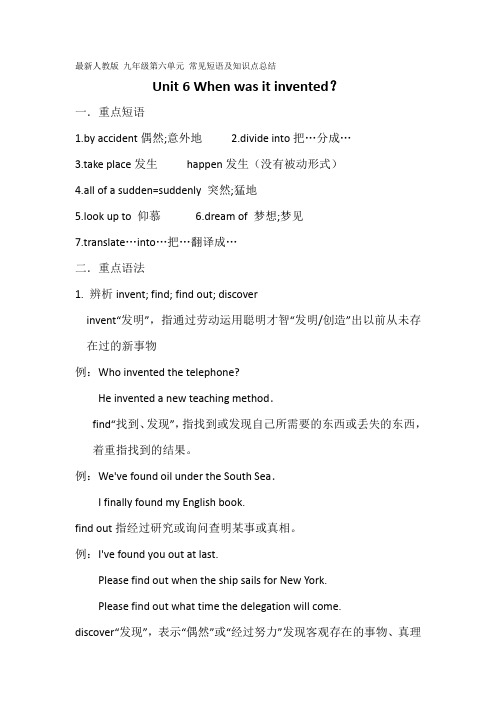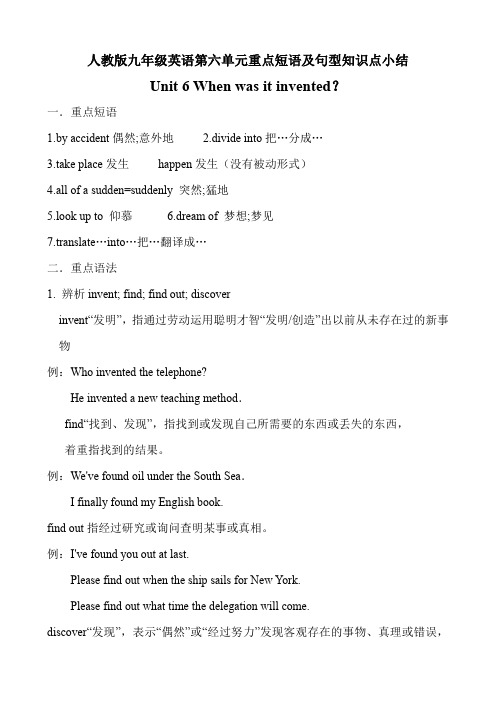第六单元短语
九年级英语第六单元重点短语和句型

第六单元的重点短语和句型主要涉及到日常生活中常用的表达方式和交流技巧。
通过学习这些重点内容,可以帮助我们更好地理解和运用英语,提高我们的语言表达能力。
重点短语:1. be good at2. be interested in3. be tired of4. be famous for5. be similar to6. be different from7. be used to8. be proud of9. be afr本人d of10. be worried about11. a lot of12. a p本人r of13. a few14. a little15. a kind of16. a lot17. a bit18. a piece of19. a set of20. a number of以上这些短语在日常交流中经常用到,掌握了这些短语可以使我们的表达更加准确和丰富。
另外,第六单元还涉及到一些重要的句型,例如:1. What are you going to do this weekend?2. I'm going to…3. What would you like to do?4. I'd like to…5. How do you like these shoes?6. I like them very much.7. What about going to the zoo?8. That sounds like a good idea.掌握这些句型可以帮助我们更好地进行日常交流,说出自己的想法和打算。
以上是九年级英语第六单元的重点短语和句型,通过认真学习和练习,我们一定可以掌握这些内容,提高我们的英语水平。
祝大家学习进步,早日成为优秀的英语学习者!九年级英语第六单元的重点短语和句型作为日常英语交流中必不可少的一部分,对于学生们来说具有重要的意义。
在学习英语的过程中,掌握这些重点内容不仅可以帮助我们更好地理解和运用英语,还能提高我们的语言表达能力,为日常交流打下坚实的基础。
九年级UNIT6单元短语句子

Unit 61 have a point有道理2 think of / about想,思考3 shoes with lights带灯的鞋4 Don’t mention it!没关系,不客气5 my pleasure我很乐意6 by accident / by chance 偶然;意外7 without doubt 毫无疑问;的确8 translate...into把。
翻译成9 fall into (fell; fallen)落入…;陷入….10 one of+最高级+名复。
之一11 take place / happen 发生;出现12 all of a sudden 突然;猛地13 less than少于,不到14 advise sb (not) to do sth建议某人(不要)做某事15 not... until 直到。
才16 work on 从事;进行17 work together 配合;合作18 take place / happen 发生;出现19 look up to 钦佩20 dream of doing sth. 梦想做某事21 take notes做笔记22 in the end最后23 at the same time同时24 stop sb from doing sth. 阻止某人做某事25 lead to (led; led) 导致26 decide on 决定;判定make a decision 做决定27 the number of。
的数量28 come up with 想出;提起think up29 more and more越来越多的30 divide…into…把。
分成31 achieve one’s dream实现梦想32 more than超过;多余33 encourage sb (not)to do sth鼓励某人(不)做某事34 not only... but also不但。
最新人教版 九年级第六单元 常见短语及知识点总结

最新人教版九年级第六单元常见短语及知识点总结Unit 6 When was it invented?一.重点短语1.by accident偶然;意外地2.divide into把…分成…3.take place发生happen发生(没有被动形式)4.all of a sudden=suddenly 突然;猛地5.look up to 仰慕6.dream of 梦想;梦见7.translate…into…把…翻译成…二.重点语法1. 辨析invent; find; find out; discoverinvent“发明”,指通过劳动运用聪明才智“发明/创造”出以前从未存在过的新事物例:Who invented the telephone?He invented a new teaching method.find“找到、发现”,指找到或发现自己所需要的东西或丢失的东西,着重指找到的结果。
例:We've found oil under the South Sea.I finally found my English book.find out指经过研究或询问查明某事或真相。
例:I've found you out at last.Please find out when the ship sails for New York.Please find out what time the delegation will come.discover“发现”,表示“偶然”或“经过努力”发现客观存在的事物、真理或错误,即指发现原来客观存在但不为人所知的事物,也可表示发现已为人所知的事物的新的性质或用途。
Columbus discovered America in1492.We soon discovered the truth.我们很快就弄清了真相。
【练习】a.Edison ____the electric lamp.b.I lost my necklace last night.I haven’t ____it.c.Who ____America first?d.Can you ____what time the train leaves?2.一般过去时的被动语态(见P188页)结构:was/were+过去分词【练习】( ) 1. People's Republic of China __ on October 1, 1949.A. foundB. was foundedC. is foundedD. was found ( ) 2. English ____ in Canada.A. speaksB. are spokenC. is speakingD. is spoken ( ) 3 This English song __ by the girls after class.A. often singsB. often sangC.is often sangD.is often sung ( ) 4 This kind of car___ in Japan.A. makesB. madeC. is makingD. is made( ) 5 Computers ___ all over the world.A. is usedB. are usingC. are usedD. have used。
小学四年级下册英语第六单元重点单词、短语、句型

举一反三:— Can I help you? 我能为您做点什么?
— Yes, I want a scarf.是的,我想要一条围巾。
2.Can I try them on? 我能试试吗?
★解读:“Can I do sth?” 是征求对方意见或建议的常用句型。try on是固定短语,意思是“试穿”。
(2)too用于肯定句句末,其前加逗号(口语中可省略逗号)时,意思是“也,还”。
I know the answer, too. 我也知道这个答案。
(3)too常与much连用构成短语too much,用来修饰不可数名词或单独使用,表示“太多”之意。
There is too much cloud in the sky. 天空中布满了云。
4.Don't knock them off the wall! 别把它们从墙上撞掉!
★解读:这是否定祈使句的句型,用来对他人表示建议பைடு நூலகம்命令和请求等。
5.It's pretty, isn't it? 它很漂亮,不是吗?
★解读:此句为反义疑问句,是疑问句的一种形式,句子结构由两部分构成。
四年级下册英语
第六单元重点单词、短语、句型
Unit 6 Shopping 购物
一、核心词汇
1.表示服饰及日用品的名词:
glove(分手指的)手套scarf围巾;披巾
umbrella伞;雨伞sunglasses太阳镜
2.描述商品的形容词:
pretty美观的;精致的expensive昂贵的;花钱多的
cheap花钱少的;便宜的nice好的
举一反三:— Can I try them on? 我能试试吗?
七年级下册第六单元重点词组.短语和句子归纳

七年级下册第六单元重点词组.短语和句子归纳一.重点词组短语。
read a newspaper 看报纸make soup 做汤go to the movies 看电影eat out 出去吃饭drink tea 喝茶Dragon Boat Festival 端午节watch Tv 看电视talk on the phone 通过电话交谈listen to a CD 听唱片use the computer 使用电脑wash the dishes 洗碗wash one’s clothes 洗衣服clean the house 打扫房子make dinner 做饭do one’s homework 做作业play basketball 打篮球swim in a river 在河里游泳swim in a pool 在水池游泳at school 在学校at the surpermarket 在超市at the library 在图书馆buy milk and bread 买牛奶和面包study in the United States 在美国学习live with an American family 和一个美国家庭住watch the boat races on TV 通过电视看龙舟赛watch a soccer onTV 通过电视看足球赛read a story to her young children 给她的孩子读故事at half past six 在六点半二.重点句子。
1. Do you want to join me for dinner? 你想加入我们一起吃饭吗?2. Do you want to go tomorrow? 你想明天去吗?3. Let’s meet at my home first. 首先在我家会面吧!4. Let’s go at seven o’clock . 让我们七点钟去吧!5. Here is a picture of my family. 这是一张我家的照片。
七年级上册英语第六单元重点短语

第六单元: 重点短语在七年级上册的英语学习中,第六单元是非常重要的一部分。
这一单元涵盖了许多重点短语,对学生的英语学习起着至关重要的作用。
在本文中,我们将重点介绍第六单元的重点短语,并且详细解释它们的用法,帮助学生更好地掌握这些短语。
1. be good at这个短语表示“擅长于”,例如:She is good at playing basketball.(她擅长打篮球。
)在句子中一般需要和某种特定的技能或活动连用。
2. get on这个短语可以表示“进步”或“与……相处”,例如:He is getting on well with his classmates.(他和同学们相处得很好。
)在句子中,具体含义需要根据上下文来判断。
3. would like to这个短语表示“想要”,例如:I would like to join the basketball team.(我想加入篮球队。
)在句子中一般用于表达愿望或请求。
4. take part in这个短语表示“参加”,例如:She takes part in the school playevery year.(她每年都参加学校的话剧演出。
)在句子中一般指参加活动或事件。
5. look after这个短语表示“照顾”,例如:Sarah looks after her little sister at home every day.(莎拉每天都在家照顾她的妹妹。
)在句子中一般指照顾他人或照顾某种事务。
6. be not afr本人d of这个短语表示“不害怕”,例如:My dog is not afr本人d of thunder.(我的狗不怕雷。
)在句子中一般用于表达对某种事物的恐惧程度。
7. look for这个短语表示“寻找”,例如:They are looking for their lost cat.(他们在找他们丢失的猫。
)在句子中一般指寻找某种物品或人。
人教版九年级英语第六单元重点短语及句型知识点小结

人教版九年级英语第六单元重点短语及句型知识点小结Unit 6 When was it invented?一.重点短语1.by accident偶然;意外地2.divide into把…分成…3.take place发生happen发生(没有被动形式)4.all of a sudden=suddenly 突然;猛地5.look up to 仰慕6.dream of 梦想;梦见7.translate…into…把…翻译成…二.重点语法1. 辨析invent; find; find out; discoverinvent“发明”,指通过劳动运用聪明才智“发明/创造”出以前从未存在过的新事物例:Who invented the telephone?He invented a new teaching method.find“找到、发现”,指找到或发现自己所需要的东西或丢失的东西,着重指找到的结果。
例:We've found oil under the South Sea.I finally found my English book.find out指经过研究或询问查明某事或真相。
例:I've found you out at last.Please find out when the ship sails for New York.Please find out what time the delegation will come.discover“发现”,表示“偶然”或“经过努力”发现客观存在的事物、真理或错误,即指发现原来客观存在但不为人所知的事物,也可表示发现已为人所知的事物的新的性质或用途。
Columbus discovered America in1492.We soon discovered the truth.我们很快就弄清了真相。
【练习】a.Edison ____the electric lamp.b.I lost my necklace last night.I haven’t ____it.c.Who ____America first?d.Can you ____what time the train leaves?2.一般过去时的被动语态(见P188页)结构:was/were+过去分词【练习】( ) 1. People's Republic of China __ on October 1, 1949.A. foundB. was foundedC. is foundedD. was found( ) 2. English ____ in Canada.A. speaksB. are spokenC. is speakingD. is spoken( ) 3 This English song __ by the girls after class.A. often singsB. often sangC.is often sangD.is often sung( ) 4 This kind of car___ in Japan.A. makesB. madeC. is makingD. is made( ) 5 Computers ___ all over the world.A. is usedB. are usingC. are usedD. have used。
八上英语第6单元短语

八上英语第6单元短语八年级上册第六单元的英语短语也不要忘记复习哦,不能只顾前不顾后哦。
下面是店铺给大家整理的八上英语第6单元短语,供大家参阅!八上英语第6单元短语11. make the soccer team 建立足球队2. get good grades 取得好的成绩3. get lots of exercise 做大量的运动4. foreign languages are not for me 外语不适合我5. sounds like a good plan 听起来是一个好的计划6. a kind of promise 一种承诺7. most of the time 大多数时间8. make promises to other people 向其他人承诺9. get back from school 放学回家10. the most common kind 最普通的一种11. at the beginning of the year 在一年的开始12. improve our lives 提高我们的生活13. write down their resolutions 写下他们的决定14. plans for the coming year 为下一年做计划15. tell their friends about their wishes 告诉他们的朋友关于他们的心愿八上英语第6单元短语21. take acting lessons 上表演课2. study computer science 学习计算机科学3. be so good at writing stories 擅长写故事4. How are you going to become a writer?你准备如何成为作家5. keep on writing stories 继续写故事6. I’m not sure about that 我不确定7. don’t worry 不要着急8. make sure 确保,查明9. try your best 尽力做到最好10. take singing lessons 上歌唱课11. go to a cooking school 去烹饪学校学习12. a race car driver 一个赛车手13. study medicine at a university 在大学里学医学14. send them to magazines and newspapers 将他们发送给杂志和报纸15. new year’s resolutions 新一年的决定八上英语第6单元短语31. about physical health 关于身体健康2. have to do with self-improvement 关于提高自身3. take up a hobby 从习惯开始做4. better planning 更好的计划5. making a weekly plan 制作一个周计划6. have one thing in common 在一件事情是相同的7. the resolutions may be too difficult to keep 可能决定太难以至于难以遵守8. make yourself a better person 使你自己成为一个更好的人9. have to find more time to study 必须找到更多的时间去学习10. the start of the year 一年的开始11. a time for making resolutions 做决定的时间12. make you a better person 使你成为一个更好的人13. make your life easier 使你的生活更简单14. my own personal improvement 我个人的提高15. make my family happy 使我的家人快乐。
- 1、下载文档前请自行甄别文档内容的完整性,平台不提供额外的编辑、内容补充、找答案等附加服务。
- 2、"仅部分预览"的文档,不可在线预览部分如存在完整性等问题,可反馈申请退款(可完整预览的文档不适用该条件!)。
- 3、如文档侵犯您的权益,请联系客服反馈,我们会尽快为您处理(人工客服工作时间:9:00-18:30)。
第六单元短语
work on 从事
take.....away 拿走,带走
a little bit 有点儿
give up 放弃
different opinions 不同的观点
once upon a time 从前
make 72 changes 做出72种变化
hide his tail 隐藏他的尾巴
the weak 弱者
fall in love 爱上,喜欢
think of ways 想出方法
sound stupid 听起来愚蠢
the whole family 整个家庭
be quiet 安静
get up 起床
be lost 迷路
get lost 迷路
go out 出去
never mind 不要紧
inside the house 在房子里面
a good way to solve his problem 解决他的问题的好方法
as soon as 一……就…..
put on 穿上
seem very possible 似乎很可能because of 因为,由于the main character 主人公
turn….. into 变成
come out 出现,出版,结果是
make a dress 做衣服
get married 结婚
all over the world 全世界
in the forest 在森林
make a plan 制定一个计划
go to sleep 去睡觉
along the way 沿路
wake up 醒来
pieces of bread 面包屑
find…out 找出
learn about 了解
remind sb of sth/sb 使某人想起某物或某人
agree with 同意
become interested in 对……感兴趣
be interested in对……感兴趣
made of由…..制成
be made of 由…..制成,指能看到原材料的
be made from 由….制成,指看不出原材料的
词的固定用法:
try to do sth 设法/努力/尝试做某事
continue to do sth 继续做某事,指做另外一件事
continue doing sth 继续做某事,指做同一件事
keep doing sth 一直做某事
be able to do sth 能够做某事
It takes/ took (for sb) +时间to do sth 花费某人多少时间做某事have no time to do sth 没有时间做某事
can’t stop doing sth 忍不住/情不自禁做某事
hear sb doing sth 听见某人正在做某事
lead sb to +地点带领某人到某地
leave sth at/in +地方把某物遗忘在某地
show sb sth 向某人展示某物
be/ become interested in doing sth 对…..感兴趣
finish doing sth 完成做某事
make sb do sth 让某人做某事
instead of doing sth 代替做某事
love doing sth 喜欢做某事
remaid sb to do sth 提醒某人做某事
remaind sb +从句提醒某人………
unless 除非,如果不,引导条件状语从句,若主句用一般将来时,从句就用一般现在时。
如:I will not go unless I hear from him.
as soon as 一….就….., 引导时间状语从句,若主句用一般将来时,从句就用一般现在时。
如:I willtell him the news as soon as he comes back.
so……that 如此….以至于….,引导结果状语从句,句型为:主语+谓语+so+形容词/副词+ that从句。
so 后面用形容词还是副词,取决于主句的谓语动词是连系动词还是实义动词,是连系动词用形容词,是实义动词用副词。
如:She worked(实义动词) so hard(副词)that she passed the exam.
He was(连系动词)so angry (形容词)that he couldn’t say a word.
感叹句的句型结构:
1.what+a/an+形容词+单数可数名词(+主语+谓语)!
What an interesting book it is!
2.What+形容词+复数名词/不可数名词(+主语+谓语)!
What beautiful flowers they are!
3.How+形容词/副词(+主语+谓语)!
How careful she is!。
